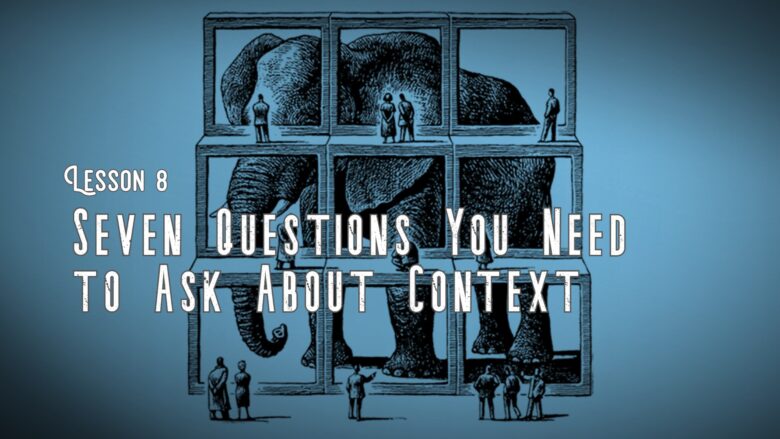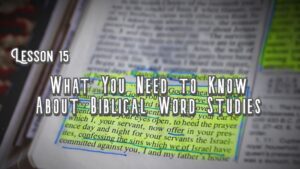Every passage has a single meaning. That was well established in Lesson 7. Now, there must be a method to finding that single meaning. In this lesson, seven questions will be submitted, questions that need to be asked whenever seeking the single meaning of any given Bible passage.
It all starts with context. Context refers to the various parts of a discourse that surround a word or passage and can throw light on its meaning (Merriam Webster). That being said, there are lots of contextual lights to shine, and it helps to approach them one at a time. An important rule of thumb is to go from big to small (see Figure 1 for an example).
Figure 1-
Using this principle, we will start with the most general contextual questions and work down to the very specific ones.
The Theological Question
How does this Bible passage or Bible book develop the greater story of the Bible? There are at least two overarching themes that are developed and revealed from Genesis to Revelation: God’s kingship/kingdom and God’s redemption fulfilled in Jesus Christ. To be fair, there are several other dominating themes, but for the sake of simplicity, I narrowed it down to these two. Job develops both of these themes (Job 12:10 & 9:33). Always ask the theological question when reading, as every book of the Bible arguably develops one or both of these bigger themes. This theological question looks at the big picture of the Bible books as a unified whole, but it is also important to note that each Bible book has a narrow purpose that will be discussed below under the “Motivation Question.”
The Literary Question
What type of literature am I reading? Each Bible book is written using a certain type of literary form. For example, Job, Psalms, Proverbs, Song of Solomon, and Lamentation are poetry. Poetry primarily uses figures of speech and parallelism to explain or emphasize a point. A rod (i.e. Psalms 2:9) is used as a figure of speech to illustrate the king of Israel’s authority and rule. Bible books are written in a number of literary forms including historical narrative, argumentative discourse, legal documentary, evangelistic discourse, apocalyptic prophesy, etc. The type of literature employed will have a huge influence on whether you should interpret phrases and words literally or figuratively. However, also note that books like 1 Samuel (historical narrative) can contain other types of literature at the same time. In 1 Samuel 2:1-10 you will find poetry. Always be aware of your literary surroundings.
The Dispensational Question
What time period (dispensation) or law governed God’s people when this Bible book was written? Many people are naïve to the fact that the Bible contains different dispensations of law, including the Patriarchal Dispensation (Job, Genesis, Exodus 1-19), the Mosaic Dispensation (the rest of the Old Testament), and the Christian Dispensation (previewed in the gospels and spanning Acts to Revelation). Without asking this question, you might end up sacrificing a bull in your backyard or believe God is speaking to you in a night vision.
The Situational Question
During what situation, culture, and time was this Bible book written? Understanding that Jeremiah writes leading up to the captivity of Jerusalem by Babylonian King Nebuchadnezzar makes a big difference. The culture and practices of Israel in that time help explain the reason for the captivity and imagery of future restoration that Jeremiah prophesies about throughout the book.
The Audience Question
Who is the audience of this Bible book or verse? This question cannot be emphasized enough. For example, understanding that Revelation is written to Christians during the 1st century who are amidst physical persecution (Revelation 1:9 & Ch. 2-3) and need encouragement will greatly impact your interpretation of imagery throughout the book. I do not believe Revelation directly prophecies about the events of 9/11. This event had absolutely no bearing on John’s audience and would be an otherwise arbitrary inclusion by John and the Holy Spirit.
The Motivation Question
What motivated the author of this Bible book to write the things he did? If you do not ask this question, you will not understand Paul’s purpose in writing 1 Timothy. Remembering what Paul said to the Ephesian elders in Acts 20:29 is key to understanding the motivation for writing 1 Timothy. This motivation question is perhaps the most important question to keep in mind when reading through Bible books or when examining single verses within a book.
The Immediate Context Question
What surrounds the Bible book or verse I am reading? This is a multi-faceted question. First, notice the location of the book you are reading. 1 Samuel 1:1 picks up where Judges 21:25 left off. This provides definition for the purpose and theme of Samuel. Second, notice the location of the chapter you are reading. Jeremiah 31 is in the middle of Jeremiah 30-33. All four of these chapters are talking about the same thing: the restoration of Israel. Failing to notice this might lead to a misinterpretation of events and imagery in any one of these chapters. Third, notice the location of the verse you are reading. John 3:16 is in the middle of a discourse about being born again by water, not coincidentally followed by a narrative about John the Baptist baptizing in the water of the Jordan River. Failing to notice these key surrounding verses can lead to misinterpretations of John 3:16.
This is just the beginning. There are other questions that need asked pertaining to context. These include asking the definition of single words, identifying the speaker within the story, and comparing the verse or phrases with other parts of the Bible. In the next lesson these seven context questions will be put to the test in the book of Acts.
Homework Questions
1. What does context mean?
2. What are two major themes found throughout scripture?
- _____________________________________
- _____________________________________
3. What is the first question you should ask to determine if a word or phrase is intended to be understood literally or figuratively?
4. Which question is important to ask so you do not end up stoning your neighbor, requiring Passover observance, and binding other Old Testament laws?
5. Which of the seven context questions do you neglect the most in your personal Bible study?
Helpful Resources
Introduction to Biblical Studies by James E. Smith
A Study Guide to Greater Bible Knowledge by Wayne Jackson
Nelson’s Complete Book of Bible Maps & Charts by Thomas Nelson Publishers

![[Tags] Bible-Context-Circle-Chart-2 Lesson 8- Seven Questions You Need to Ask About Bible Context](https://fiveminutebiblestudy.com/wp-content/uploads/2017/08/Bible-Context-Circle-Chart-2.jpg)



Comments
“Every passage has a single meaning”. I agree, yet disagree. When the Israelis were leaving Egypt, those verses can be both about the physical act of them leaving Egypt, but it can also be about us leaving the bondage of sin.
Author
Thanks for your comment Gary. Let me illustrate what is meant by the original statement. Exodus 3:10 says, “I will send you to Pharaoh that you may bring My people, the children of Israel, out of Egypt.” This passage, in it’s original context and meaning, was literally referring to the physical Exodus of Israel out of Egypt. It did not have any immediate reference to the metaphorical exodus from sin that God’s people would experience. Now, with that said, Jesus said, “Whoever commits sin is a slave of sin. And a slave does not abide in the house forever, but a son abides forever. Therefore, if the Son makes you free, you shall be free indeed” (John 8:34-36). Jesus uses Exodus language to make the analogy for the freedom that He offers to people of His day and our day – freedom from sin. When I said, “Every passage has a single meaning,” I did not mean that biblical events or statements from scripture cannot later be used to make different points or be used figuratively, but each original passage has a single meaning that is determined by it’s context. I hope this makes sense and finds itself more agreeable.